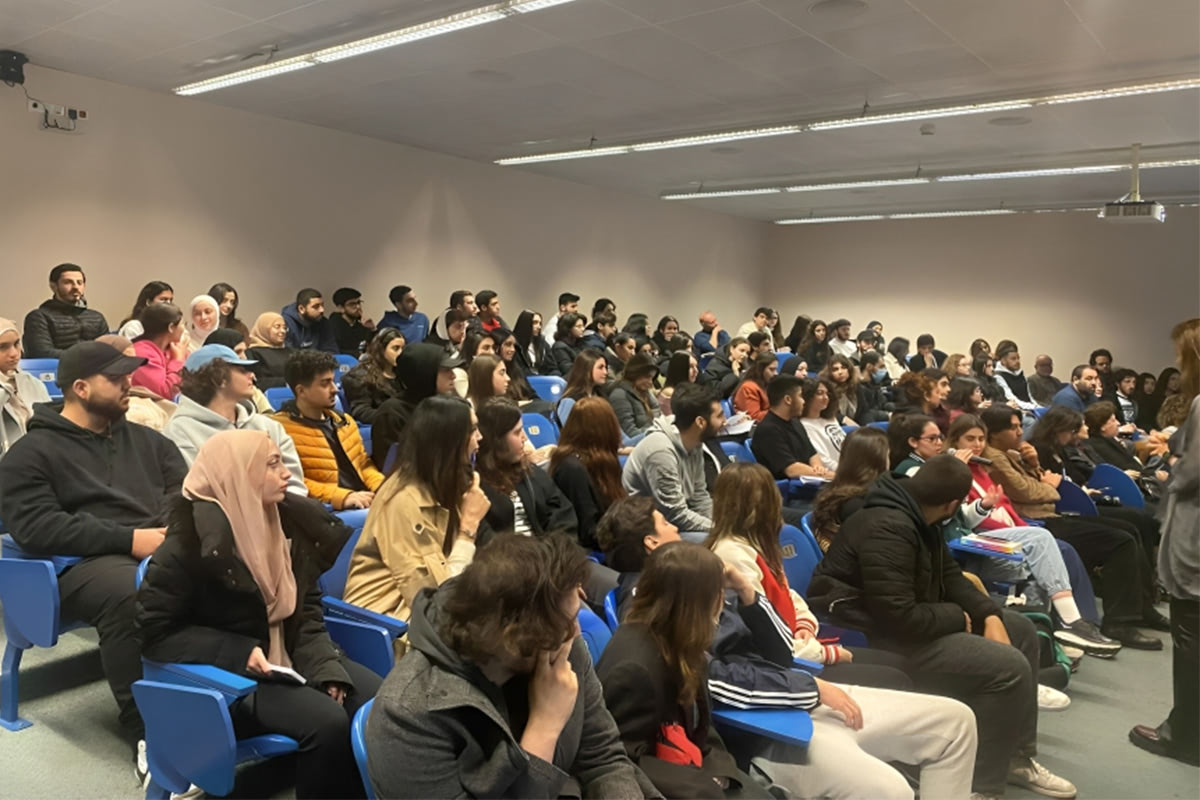How Does Digital Media Impact Our Brain?
LAU’s Deema Dakakni examines digital media’s impact on mental and cognitive health and explores the implications on learners.
As digital media and access to information advances at warp speed, the cognitive health of those on the consuming end comes into question. The fact that young learners are among these end users invites yet another question: how does digital media affect education?
These themes were the focus of a session titled Your Brain Vs. Digital Media: 0-3, delivered on March 22 by Senior Instructor of English Deema Dakakni, who had also previously held a lecture on the addictive nature of media consumption on the brain.
The talk—which explored ways in which technology has transformed educational approaches and how hybrid learning tools have become ubiquitous post-pandemic—aimed to inform parents and students alike about the negative effects of excessive digital media usage and promote a balanced approach to technology in education and daily life.
What sparked your interest in hosting lectures on the influence of digital media on the brain?
Well, my interest in the topic began with investigating how female students often outperformed their male counterparts in second-language classrooms in a university setting, either due to cultural factors or brain variances. But, as I delved deeper, I began to notice a decline in overall student performance, irrespective of gender, in proportion to increased digital device usage during the pandemic.
This inspired my PhD dissertation as I started noticing my students’ reduced ability to comprehend simple three-paged texts, or their increased tendency to memorize and regurgitate concepts that had been explained, broken down, spoon-fed and explained even more.
How does digital media play a role in education in this context?
We can’t deny that digitalization has brought many advantages. Easy navigation through hyperlinked content, access to information from diverse sources, and endless means of communication through digital platforms are all great assets. With the rise of the COVID-19 pandemic, such interactive learning tools, multimedia resources, and online platforms further accelerated the adoption of digital solutions in education.
We’ve got an amazing amount of information at our fingertips thanks to all the digital tools available. But it’s crucial not to overlook the value of traditional teaching methods. We need to strike a balance between embracing technology and holding on to the time-tested ways of educating students. All of this click-away access can also heavily damage the students’ mental processes, from cognitive overload and diminished critical thinking skills to decreased attention spans.
What tangible impact does it have on students’ academic performance?
The allure of digital devices causes distractions during learning activities as students may find it hard to focus on educational content when social media, games, or other non-educational apps are just a tap away. This constant attention-switching affects their ability to concentrate on academic tasks and can result in lower productivity and learning outcomes.
Additionally, excessive screen time can affect reading habits and comprehension skills, given that students may develop a preference for skimming or scanning content rather than engaging in deep reading and analysis. This can lead to surface-level understanding and difficulty in comprehending complex information or critically evaluating textual materials.
What does science say about this phenomenon?
It’s quite concerning, actually. According to many neuroscience studies, digital exposure impacts brain structure and function. Several cases have revealed changes in gray matter volume, particularly in the prefrontal cortex responsible for executive functions like decision-making, impulse control, and emotional regulation.
From a mental health perspective, it’s important to note that the structural impact of digital technology on the brain can lead to unstable mental and emotional behaviors like anxiety, panic attacks, obsessive-compulsive disorder, depression and aggression. This occurs as the technology shrinks the brain centers responsible for regulating these responses.
What advice would you give to educators and parents in regulating digital media consumption?
I call for educators and parents to explore mindful strategies to promote healthy habits. Between regular exercise, a balanced diet rich in brain-nourishing nutrients and mindfulness practices—such as meditation and deep breathing—these informed strategies and engagements are instrumental in fostering cognitive resilience and emotional wellbeing.
Unplug from digital devices. Spend time in nature. Engage in creative pursuits. Nurturing all of these meaningful relationships contributes significantly to mental vitality and overall health while harnessing the benefits of the digital age.
I would gladly hold such lectures for parents, as they may not be aware of the massive repercussions digital tech has on the brains of their children, or at least, may be underestimating the damage. I definitely plan to host more lectures on this backed up with more research.
This interview has been edited and condensed for the sake of clarity.
